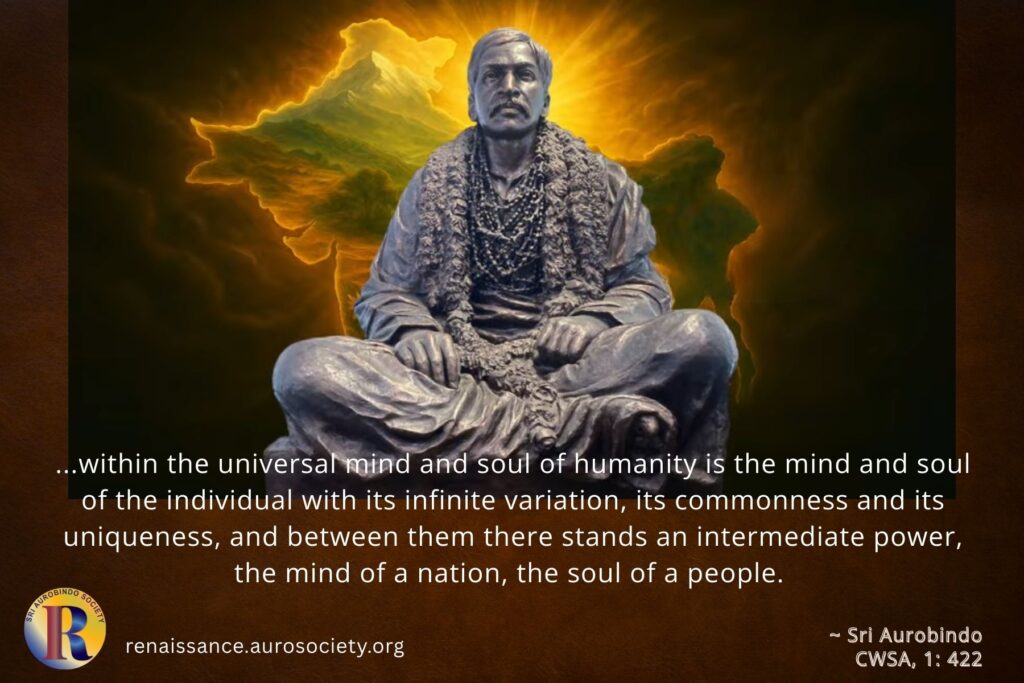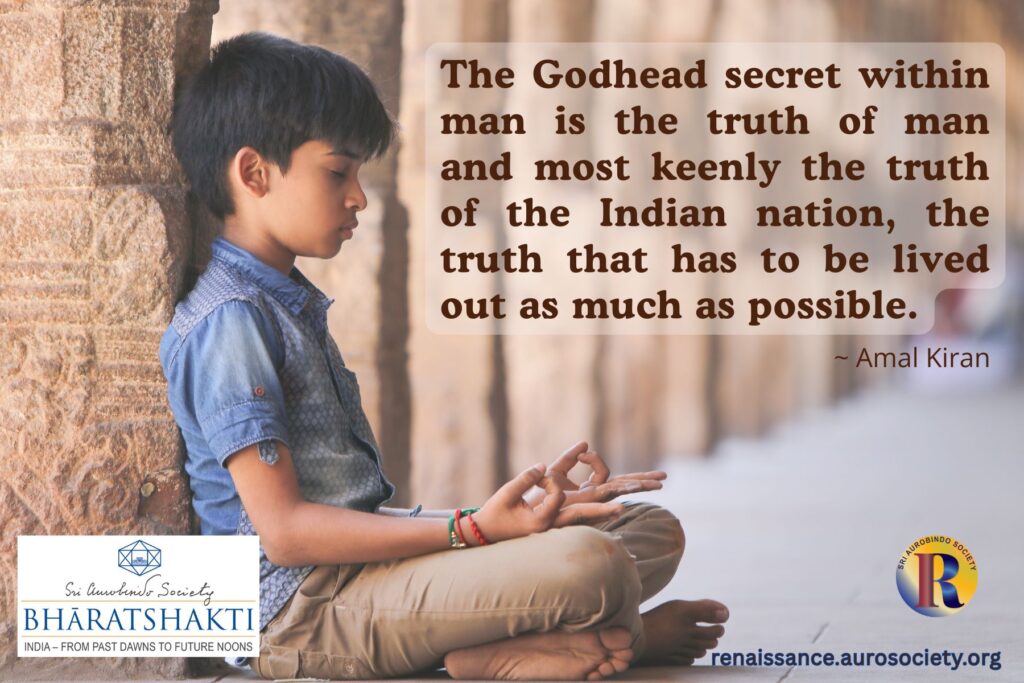Volume 1, Issue 3
Author: Sri Aurobindo
Editor’s Note: Selections from Sri Aurobindo describing the deeper purpose and work of Indian nationalism are featured here.
The Ideal of Nationalism
Without a great ideal there can be no great movement…. We must not bend the knee to others but try to be worthy of our past—here is an ideal which, if set forth with conviction and power, cannot fail to inspire self-sacrificing action. We need faith above all things, faith in ourselves, faith in the nation, faith in India’s destiny….
Unbelief is blind—it does not see far ahead, neither stimulates strength nor inspires action. The lack of this faith has kept our moderate politicians tied down to a worn-out ideal which has lost its credibility.
(Sri Aurobindo, CWSA, Vol. 6, p. 348)
***
The return of India on her eternal self, the restoration of her splendour, greatness, triumphant Asiatic supremacy is the ideal of Nationalism. … The ideal creates the means of attaining the ideal, if it is itself true and rooted in the destiny of the race.
(Sri Aurobindo, CWSA, Vol. 7, pp. 1087-1088)
The Living Nationalism
When the word of the Eternal has gone abroad, when the spirit moves over the waters and the waters stir and life begins to form, then it is a law that all energies are forced to direct themselves consciously or unconsciously, willingly or against their will, to the one supreme work of the time, the formation of the new manifest and organised life which is in process of creation.
So now when the waters of a people’s life are stirred and the formation of a great organic Indian state and nation has begun, the same law holds. All that the adversaries of the movement have done whether they have tried to repress or tried to conciliate, has helped what they sought to destroy and swelled the volume and strength or purified as by fire the forces of Nationalism.
*****
When a community sues for separate rights from the bureaucracy, that is a sign not of life but of stagnant dependence which is death, but when it seeks a larger place in the national existence and it tries to feel its own existence and its own strength, it is a true sign of life, and what Nationalism asks is for life first and above all things; life, life and still more life, is its cry.
Let us by every means get rid of the pall of death which stifled us, let us dispel first the passivity, quiescence, the unspeakable oppression of inertia which has so long been our curse; that is the first and imperative need.


*****
The Mission of Nationalism
To recover Indian thought, Indian character, Indian perceptions, Indian energy, Indian greatness, and to solve the problems that perplex the world in an Indian spirit and from the Indian standpoint, this, in our view, is the mission of Nationalism.
We agree … that an exclusive preoccupation with politics and economics is likely to dwarf our growth and prevent the flowering of originality and energy. We have to return to the fountainheads of our ancient religion, philosophy, art and literature and pour the revivifying influences of our immemorial Aryan spirit and ideals into our political and economic development.”
(Sri Aurobindo, CWSA, Vol 8, p. 245)
*****
The debasement of our mind, character and tastes by a grossly commercial, materialistic and insufficient [modern] education is a fact on which the young Nationalism has always insisted. The practical destruction of our artistic perceptions and the plastic skill and fineness of eye and hand which once gave our productions pre-eminence, distinction and mastery of the European markets, is also a thing accomplished.
Most vital of all, the spiritual and intellectual divorce from the past which the present schools and universities have effected, has beggared the nation of the originality, high aspiration and forceful energy which can alone make a nation free and great.
To reverse the process and recover what we have lost, is undoubtedly the first object to which we ought to devote ourselves.
And as the loss of originality, aspiration and energy was the most vital of all these losses, so their recovery should be our first and most important objective.
The primary aim of the prophets of Nationalism was to rid the nation of the idea that the future was limited by the circumstances of the present, that because temporary causes had brought us low and made us weak, low therefore must be our aims and weak our methods.
They pointed the mind of the people to a great and splendid destiny, not in some distant millennium but in the comparatively near future, and fired the hearts of the young men with a burning desire to realise the apocalyptic vision.
As a justification of what might otherwise have seemed a dream and as an inexhaustible source of energy and inspiration, they pointed persistently to the great achievements and grandiose civilisation of our forefathers and called on the rising generation to recover their lost spiritual and intellectual heritage.
It cannot be denied that this double effort to realise the past and the future has been the distinguishing temperament and the chief uplifting force in the movement, and it cannot be denied that it is bringing back to our young men originality, aspiration and energy…
To raise the mind, character and tastes of the people, to recover the ancient nobility of temper, the strong Aryan character and the high Aryan outlook, the perceptions which made earthly life beautiful and wonderful, and the magnificent spiritual experiences, realisations and aspirations which made us the deepest-hearted, deepest-thoughted and most delicately profound in life of all the peoples of the earth, is the task next in importance and urgency.
Sacrifice and Selflessness
It is not by patriotic desires that a nation can be liberated, it is not by patriotic work that a nation can be built. For every stone that is added to the national edifice, a life must be given. It is not talk of Swaraj that can bring Swaraj but it is the living of Swaraj by each man among us that will compel Swaraj to come.
The kingdom of Heaven is within you; free India is no piece of wood or stone that can be carved into the likeness of a nation but lives in the hearts of those who desire her, and out of these she must be created. We must first ourselves be free in heart before our country can be free…. How then can we live Swaraj? By abandonment of the idea of self and its replacement by the idea of the nation.
As Chaitanya ceased to be Nimai Pandit and became Krishna, became Radha, became Balaram, so every one of us must cease to cherish his separate life and live in the nation. The hope of national regeneration must absorb our minds as the idea of salvation absorbs the minds of the mumukshu. …
Regeneration is literally rebirth and rebirth comes not by the intellect, not by the fullness of the purse, not by policy, not by change of machinery, but by the getting of a new heart by throwing away all that we were into the fire of sacrifice and being reborn in the Mother.
Self- abandonment is the demand made upon us. She asks of us, “How many will live for me? How many will die for me?” and awaits our answer.
*****

Inculcating Patriotism in the Youth
The only way of inculcating a quality into a nation [is] by instilling it practically into the minds of its youth at school and College until it becomes an ingrained, inherent, inherited national quality. This is what we have to do with the modern ideal of patriotism in India.
We have to fill the minds of our [children] from childhood with the idea of the country, and present them with that idea at every turn and make their whole young life a lesson in the practice of the virtues which afterwards go to make the patriot and the citizen.
If we do not attempt this, we may as well give up our desire to create an Indian nation altogether; for without such a discipline nationalism, patriotism, regeneration are mere words and ideas which can never become a part of the very soul of the nation and never therefore a great realised fact. Mere academical teaching of patriotism is of no avail….
A teacher may by his personal influence and teachings so surround the minds of his students with the idea of the country, of work for the country, of living and dying for the country, that this will become the dominant idea of their minds and, if associated with any kind of patriotic discipline or teaching in action, the dominant note in their character.



